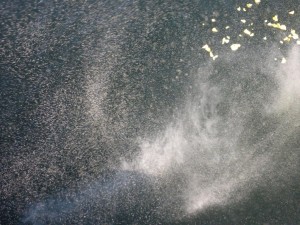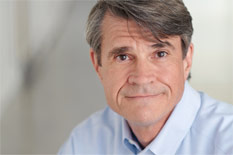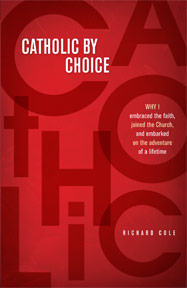FOR IMMEDIATE RELEASE Contact: Kelly Hughes, (312) 280-8126
kelly@dechanthughes.com
Award-winning writer Richard Cole presents a love story about conversion and the honeymoon of faith in his new memoir, Catholic by Choice: Why I Embraced the Faith, Joined the Church, and Embarked on the Adventure of a Lifetime (Loyola Press, March 2014).
Catholic by Choice looks at Catholic conversion from the point of view of a modern adult convert, telling a relatable story of spiritual discovery, doubt and eventual happiness. Cole tells his story with candor, pointing to the tone of openness set by Pope Francis as his model. The irreverent humor and deep joy found in faith will call to mind a Catholic, male Anne Lamott.
Cole’s story began sixteen years ago when he visited a Benedictine monastery in South Texas for three days of peace, quiet, and uninterrupted reading time. Although an unbeliever at the time, his brief getaway lit a spark of faith that began “an intense, painful, and utterly dazzling” time in which Cole fell in love with God, became a Christian, and joined the Catholic Church.
Cole grew up nominally Protestant with little understanding of Catholicism. As strange an experience as religious feeling was for him, he felt increasingly drawn to the Catholic Church, with an intensity that made him feel like his “heart was going to explode.” The strangeness was part of the attraction, he admits: “Catholicism was my exotic country, and along with everything else, I loved it because it was foreign to me.”
Cole discovered that the hardest thing about becoming a Catholic for him, a recovering alcoholic and introverted poet, would be carrying his faith into the world, “coming out of my nook, and living as a Christian with my wife, kids, and everyone at work.” He writes about the tension his newfound faith caused at home. His wife, a former Catholic immersed in New Age spirituality, was supportive but frustrated by Cole’s lack of respect for her explorations, and the distance his conversion was creating between them. “I wanted both of us to be on a path of discovery, but I wanted her path to be just like mine,” Cole writes. “Converts want the whole world not only to convert but also to convert the way they have.”
“The Catholic Church and culture understand how unstraight the human heart can be,” Cole writes. “So do other churches, of course, but I felt that Catholic understanding was deeper, if only by the sheer weight of experience.”
Richard Cole is the author of two collections of poetry: The Glass Children and Success Stories. His poetry and prose have been published in The New Yorker, Poetry, The Sun, Hudson Review and Image Journal: Good Letters. He works as a business writer in Austin, TX. Learn more at www.richard-cole.net.


